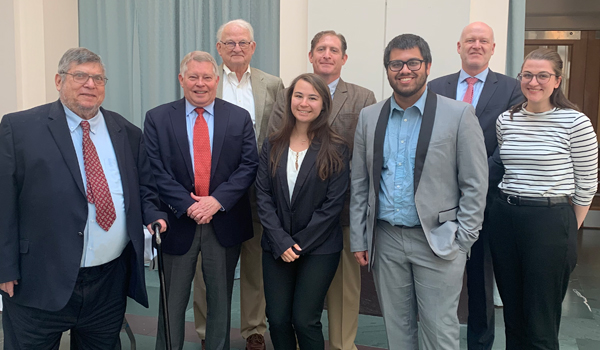J. Michael Luttig, retired judge of the 4th U.S. Circuit Court of Appeals, spoke at The Catholic University of America Columbus School of Law (Catholic Law) on Wednesday, April 26, to voice his views on the currently pending Supreme Court (SCOTUS) case Moore v. Harper. Referring to the case as “the single most important case on American democracy—and for American democracy—in the nation's history,” Judge Luttig provided an in-depth explanation and subsequent strong denunciation of the independent state legislature theory underlying the petitioners’ case as a threat to the integrity of the American electoral process.
Introduced by longtime Catholic Law Professor Marshall Breger, alongside whom he worked in the Reagan Administration, Judge Luttig explained the theory’s approach and its relevance to Moore v. Harper. This case, which began following the North Carolina legislature’s submission of a petition for a writ of certiorari, made its way to SCOTUS in December 2022. Judge Luttig serves as a co-counsel for the respondents.
The independent state legislature theory (ISL) posits that the U.S. Constitution precludes state supreme courts from reviewing redistricting decisions affirmed by state legislatures. Additionally, it often asserts that such courts likewise cannot review a state legislature’s decisions regarding the choosing of presidential electors. For this reason, it was this theory that the legal team of former President Donald J. Trump attempted to employ when it challenged the results of the 2020 presidential election. Judge Luttig highlighted that SCOTUS has long remained reticent about confronting the ISL, noting that Moore v. Harper will be the Court’s first direct confrontation with the theory. Moore v. Harper challenges a state supreme court’s power to review a state legislature’s constitutionally-supported choice of the time, place, and manner for federal election.
Judge Luttig, whom then Vice President Mike Pence cited in his 2021 statement affirming his lack of constitutional authority to reject electoral college votes, has been a vocal opponent of the ISL. His outspoken criticism of the ISL has garnered support from the Editorial Board of The New York Times, and he has expressed his opposition through publications such as The Atlantic. He has additionally opined on matters of judicial ethics in regards to the Supreme Court—a topic about which news aggregate Reuters interviewed him, during his visit to Catholic Law.
 Following the conclusion of Judge Luttig’s talk, several students groups affiliated with Catholic Law hosted a networking reception. During this time, Judge Luttig remained in attendance and interacted with students.
Following the conclusion of Judge Luttig’s talk, several students groups affiliated with Catholic Law hosted a networking reception. During this time, Judge Luttig remained in attendance and interacted with students.
